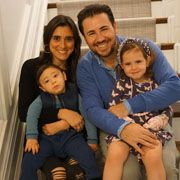Antisemitism During the Pandemic: Less Physical Violence, Upsurge in Online Antisemitism
On the Eve of Israel's Holocaust Remembrance Day, the Kantor Center for the Study of Contemporary European Jewry publishes the Antisemitism Report for 2020
The Antisemitism Report for 2020 – the year of COVID-19 – published today by the Kantor Center for the Study of Contemporary European Jewry at Tel Aviv University's Faculty of Humanities in cooperation with the European Jewish Congress – indicates contradictory trends: On the one hand, a decrease was seen in physical violence resulting from the reduced encounters between Jews and violent anti-Semites due to the lockdowns. On the other hand, accusations against the Jews (allegedly responsible for the global disaster), were manifested in a rise in blatant antisemitic expressions on the internet in general and on social networks specifically. In addition, new phenomena developed on the internet, such as zoom bombing and the darknet, which are difficult to quantify.
The Report is based on thousands of testimonies from different places around the globe, received throughout 2020 from the international network established by the Kantor Center several years ago - which includes about 60 participants who regularly send in information about antisemitism worldwide.
WATCH the interview with Prof. Dina Porat, Head of the Kantor Center:
According to Prof. Dina Porat, Head of the Kantor Center: "The coronavirus pandemic and the resulting reality dictated both the nature and extent of antisemitism in 2020, which was an unusually tense and turbulent year all over the world. Prejudice, superstition, primordial emotions, and bizarre theories surfaced on the scene, and manifestations of antisemitism, both verbal and visual, were vicious and outrageous. Blaming the Jews and Israelis for developing and spreading the coronavirus (or the 'Judeovirus'), was the main motif in this year's antisemitic manifestations. This notion is rooted in a deep fear of the Jew/Israeli as a spreader of disease in both the past and present."
Blaming the Jews and Israelis for developing and spreading the coronavirus (or 'Judeovirus') is a graver accusation than any previously made against Jews throughout history: As the pandemic began to spread across the globe, it was immediately followed by accusations that the virus had been developed and was being spread by Jews and Israelis: they are the ones who would find a cure and vaccine for the disease, selling it to the ailing world and making a huge profit. Over the following months this libel spread rapidly. We received reports to this effect from dozens of countries, in the form of aggressive messages and numerous malicious caricatures.
Moreover, the accusation was heard not only from extremist circles, such as white supremacists, ultra-conservative Christians, or the usual accusers like Iran, Turkey and the Palestinian Authority, and especially Iran, that invested efforts in disseminating the accusation. It also spread to populations without well-defined political or ideological identities.”
Fewer Encounters, Fewer Violent Events
As noted above, lockdowns in the various countries reduced encounters between Jews and their ill-wishers, and consequently the number of violent events declined from 456 (in 2019) to 371 in 2020 – a number that was typical of 2016-18. No one was murdered this year for being Jewish (although physical attacks could potentially have had fatal outcomes), and the number of bodily injuries decreased from 170 in 2019 to 107 in 2020. Damage to private property was also reduced from 130 to 84 incidents, simply because people mostly stayed at home.
In most countries a decrease was registered in the number of violent incidents, attacks on both people and their property, threats and arson. However, vandalism towards Jewish communal property and institutions remained as frequent, and in some cases they became more frequent (see table). The number of desecrations of graveyards, Holocaust memorials and other Jewish monuments (open and unprotected sites) rose from 77 (2019) to 96 (2020) incidents worldwide, and the number of vandalized synagogues (being closed, they became easy targets) also increased from 53 (2019) to 63 (2020).
|
|
Violent incidents |
Physical injury |
Damage to property |
Desecration of synagogues, graveyards and Holocaust memorials |
|
2020 |
371 |
107 |
84 |
159 |
|
2019 |
456 |
170 |
130 |
130 |
In the US, a gradual rise in acts of violence has been observed for several years, reaching 119 this year (compared to 99 in 2017 for example), and Germany also saw a significant escalation in the total number of cases, from a total of 2,032 in 2019 to 2,275 in 2020, including 59 physical injuries. In both countries, vandalism accounted for most of the incidents.
A significant decline was noted in Australia, the UK and especially France, where the Ministry of the Interior and the Jewish Community both reported a drop of 50% in all types of antisemitic incidents, due to the tight lockdown, as well as in Canada, where the number of violent cases dropped by more than half. Most incidents occurred in countries with large Jewish communities: the US, Canada, the UK, Australia, France and Germany. In all other countries, with the exception of Ukraine, less than 10 incidents (per country) were reported in 2020.
Online Antisemitism
Since the public space was shut down during the pandemic and people stayed at home, activities on social media, including antisemitic activities, increased significantly, characterized by aggressiveness and verbal abuse. Such phenomena, however, are inherently difficult to quantify.
- Zoom bombing: When zoom became a major means of communication, a phenomenon called zoom-bombing emerged - breaking into zoom conferences of synagogues, Jewish community centers and Jewish students, disrupting the meetings and using the platform to display swastikas, antisemitic presentations or speeches. In the US alone, 200 cases of zoom bombing were registered.
- Development of the darknet: Extremist groups, especially from the far right, like white supremacists and neo-Nazis, left the open social networks, and descended into the darknet, which grew significantly over the past year. There, they are free of any supervision or restrictions and can run their own websites, undisturbed. Consequently, the number of antisemitic manifestations on the open networks declined, while activities on the darknet intensified.
Vaccine Opponents and the Holocaust
Vaccine opponents equated the restrictions and lockdowns aiming to contain the pandemic with policies of the Nazi regime, accusing the establishment and governments in various countries of applying means of coercion: lockdowns were compared to incarceration in ghettos and concentration camps; vaccines were described as medical experiments; certificates granting privileges after vaccination were seen as the infamous 'selection' procedure in Nazi death camps; antivaxxers felt that they were as undesirable and persecuted as the Jews had been; the epitaph on the gate to Auschwitz served as a source for the new slogan 'Vaccination liberates'; and so on.
In Germany, where opposition to the vaccines is particularly strong, demonstrators wore a yellow star on their clothes, with the word 'unvaccinated' replacing the word 'Jew', and called Chancellor Merkel a Nazi.
The advent of the vaccines, coupled with Israel's vast vaccination campaign, assisted by Israelis and Jews who hold prominent positions in the companies that produce these vaccines (such as Tal Zaks, Chief Medical Officer at Moderna, and Pfizer CEO Albert Bourla), was used to reinforce these accusations: Israelis and Jews join hands so that Israel may be the first to recover from the pandemic, while the rest of the world stands in line and begs the Jews for help.






